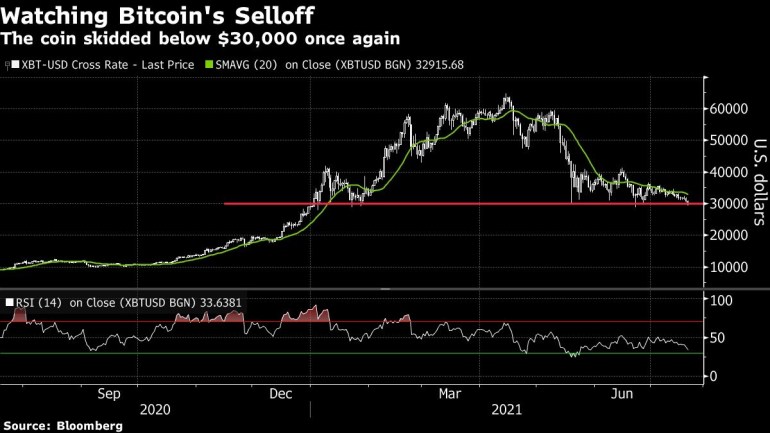The largest digital coin fell 3.6 percent to $29,667 Tuesday in New York with other digital currencies also retreating.
A selloff in Bitcoin accelerated Tuesday, pushing it below $30,000 for the first time in about a month.
The largest digital coin fell 3.6% to $29,667 as of 7 a.m. in New York. Other virtual currencies also retreated, including second-ranked Ether. The Bloomberg Galaxy Crypto Index was down about 4%.
Some traders had viewed $30,000 as a key support that might open the way to more losses if breached. Further big declines from here could rattle the cryptocurrency market and even exacerbate a wider flight from risk assets such as stocks. Global equities are falling due to fears of slowing economic growth and the relentless spread of the delta variant of COVID-19.
“We’re going to need to form another base first before resuming another bull trend,” said Vijay Ayyar, head of Asia Pacific with cryptocurrency exchange Luno in Singapore. “We are going to be ranging between $20,000 and $40,000 for the rest of the year.”
Narratives that had propelled Bitcoin to a mid-April record of almost $65,000 are now being questioned. Some had argued the digital asset could act as a hedge against inflation due to its limited supply. But Bitcoin’s 2% advance this year lags behind the S&P 500’s 13% advance.
“Investors who are allocating to crypto know that volatility is going to be part of it,” Grayscale Investments CEO Michael Sonnenshein said in an interview on Bloomberg TV.
Bitcoin has been hit by many setbacks of late, including China’s regulatory crackdown – partly over concerns about high energy consumption – and progress in central bank digital-currency projects that could squeeze private coins.
The creator of meme-token Dogecoin recently lambasted crypto as basically a sham, and the appetite for speculation is generally in retreat.
Officials around the world are also intensifying scrutiny of cryptocurrencies. On Monday, Treasury Secretary Janet Yellen pushed top U.S. financial regulators to accelerate their consideration of new rules to police so-called stablecoins.





